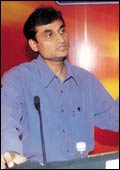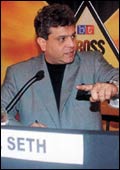 |
 |
 |
| The pricing conundrum: Moderator
Suhel Seth flanked by C.K. Ranganathan (left) and Rajeev karwal |
The
business today Crossfire in Chennai, held at the Taj Coromandel,
was kicked off by moderator Suhel Seth with the same sponsor, Royal
Challenge, and the same ground rules-and an exhortation to get to
blows.
"Can Indian consumers be wooed by pricing
alone?" was the vexed issue over which that was to be achieved.
Rajeev Karwal, Managing Director of Electrolux, was to argue for
the motion, and C.K. Ranganathan, founder, CavinKare, against. Yes,
against.
Karwal began pithily. "Pricing is actually
everything," he declared, before launching into the hundreds
of price propositions being dangled before Indian consumers. Jet
Airways' super-cheaper business class, Maruti Alto's gold offer
and even Yamaha's 'Suhana mausam aaya, sunehra offer laaya.'
| Consumers are intelligent.
They see value, and value is performance divided by price. When
they bite 'special offer' baits, they merely go for incremental
value. Only marketers think that pricing is playing the trick |
Even the morning's paper was packed with price
offers, he noted, and Hindustan Lever's so-called 'power brands'
were no different. Power, even for these, was little other than
price, apparently. And how could anyone forget Akai's Kabir Mulchandani,
who "rewrote the history of consumer electronics in this country"
with his replacement TV offers that sent prices into a downward
spiral and volumes soaring? "As the prices fell from Rs 18,000
for a 21-inch colour TV to Rs 8,990, the market grew from 1.7 million
units in 1995 to 7.2 million in 2002." Or take the VCD market,
where the upstart Oscar was selling 100,000 players a month, about
half the market-priced at a steal.
"Ultimately, it is the price and price
alone that makes the market," Karwal asserted, citing the value
consumers see in the Rs 5 Coke, the diesel Indica, the Maruti 800,
the Nirula's pizza, the seven-rupee McDonald's softie and the Ghadi
suds pack (which is "doing to Nirma what Nirma did to Surf").
And then there's Barista the self-claimed experience brand. "Why
is it reducing prices today?" he demanded, leaving his rhetoric
to the floor.
|
|
"Ultimately, it is the
price and the price alone that makes the market"
Rajeev Karwal, Managing
Director, Electrolux |
Next was Ranganathan's turn, and he began by
clarifying that CavinKare, contrary to media belief, was not really
a price player-and was busy winning marketshare with brands such
as Fairever, priced at a premium to the fairness cream market leader.
In fact, Chik shampoo was his only real price aggressor. What he
was objecting to, first off, was the 'Indian' part of the motion
-because discounts on brands are common worldwide. Secondly, agreeing
to the motion would be to mock the Indian consumer's appreciation
of quality. "If pricing alone is the purchase criterion,"
he said, "it questions the very existence of brands."
Everything would be a commodity. But that's not the case. From salt
to soap, loose products command less money than branded ones. "Obviously
people see value, and value is normally equal to performance divided
by price." And when they bite 'special offer' baits, they merely
go for 'incremental value' per rupee, not 'price' in isolation.
Complex minds, discerning minds, are at work. "Consumers are
intelligent. Only we marketers think that pricing is playing the
trick," he said.
That was temptation enough for Seth to fling
David Ogilvy's 'The consumer is not a moron, she's your wife' admonition
into the ring, before inciting Karwal to hit right back. Who did
too, by raking up the low-priced Chik as his opponent's biggest
success, and reminding everyone of the correlation of onion prices
with government longevity.
|
|
"If pricing alone is
the purchase criterion, it questions the very existence of brands"
C.K. Ranganathan, Founder,
CavinKare |
Value is fine, Karwal argued, but 'value' is
driven by price. Ranganathan shook his head, outlined his 'value
for money' thesis again-the entire equation-and called his opponent's
price fixation the result of an illusion.
What about the 'bargain' mindset, asked Seth,
was that price or value seeking behaviour-in a country where disposable
lighters get refuelled? Price obviously, said Karwal, this being
a money-deprived country "where condoms are being reused".
Value, said Ranganathan, this being a country where housewives actually
go from vendor to vendor looking for vegetables of acceptable quality
to cook.
But Akai is dead, piped up someone, and so
were price-cutters doomed to failure? "Wal-Mart is on top of
the Fortune 500," replied Karwal, "and its basic proposition
is 'Every day, lower price'." Akai's another story, he said.
"I think the demise of Akai was because of many other factors,
and not just pricing. But the pricing brought the company almost
to an 18 per cent marketshare."
Sure, said Ranganathan, but consumers' consciousness
revolves more around the value being derived from the purchase,
not the cash being shelled out-so one cannot woo consumers with
price, price, price alone.
|
